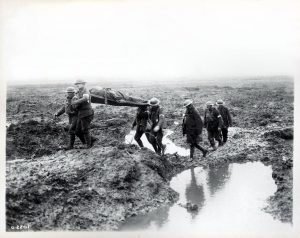It has been a long time since letters from Jack have been released on this site. This is simply because he was back in England, undergoing training at the Senior Officers’ School at Aldershot and he did not write many letters. Indeed, those that he did write were short notes to his family that he was going to attend Saturday dinner. Jack flourished at Aldershot; it seemed that he was suited to military service and, as a result, his superiors judged him fit for service as the commanding officer of the 8th Queen’s. When he finally returned to the front at the end of January 1918, he took charge.
In his three-month absence from the front, however, the 8th Queen’s remained actively engaged in major offensives. As usual, the battalion rotated between manning the front lines, serving in support, and recuperating, training, and cleaning up at a rest camp at Vendelles. All of their movements are tracked in the battalion’s war diary, which is a fantastic resource that gives insight into the military details of service on the western front. The notes in this diary, written by a junior officer in the battalion, help us reconstruct where the 8th Queen’s was in those last few months of 1917, when Jack himself was back in England.
Let’s take a look at the movements of the 8th Queen’s.
The 8th Queen’s was in the rest camp at Vendelles after a brief tour at the front when the First Battle of Passchendaele began on October 12, 1917. Three days later, the battalion moved into the front lines, where they worked on fixing up the trenches and sending out patrols at night. According the war diary, the Germans were “very much quieter” than they had been during the battalion’s previous tour at the beginning of the month. The lack of enemy activity “probably was due to our prompt and & heavy retaliation,” the officer wrote, exhibiting pride in his unit’s work. When this tour ended, the 8th Queen’s remained in support from October 23-25 before heading straight back into the front lines on October 26 for the commencement of the Second Battle of Passchendaele. This time, there were plenty of enemy bombardments.
On November 1, the 8th Queen’s was finally relieved and retired once again to the rest camp in Vendelles. The battalion was nevertheless quite busy during this time, scraping the mud and dirt off of their kits and uniforms, organizing working parties, and engaging in tactical exercises. They had just one day of true rest. The 8th Queen’s went back to the front line trenches on November 7 and remained there until November 13, where they dealt with fierce fire from the enemy and torrential rain that made the trenches collapse. When they were relieved on November 14, the battalion remained in support and organized working parties to repair the extensive damage to the trenches. They returned to the front line on November 18.
The Battle of Cambrai began on November 20. That night, the battalion carried out a raid on the German trenches. They had three simple objectives. First, unsurprisingly, to “inflict casualties.” Second, to “obtain identification,” and third, to “capture prisoners.” The raid was successful, with the battalion managing to take control of one of the German machine guns. Between heavy enemy bombardments part of the line on November 21 and 22, dummies were set up in front of the trenches to draw fire. The trick worked. For the rest of the tour, the battalion dealt with plenty of fire from the Germans and gave it back. They finally retired to rest camp on November 26.
The 8th Queen’s was in the trenches when the Battle of Cambrai ended on December 7. They noted plenty of activity from enemy airplanes and launched gas mortars at the Germans on December 8. Until December 21, the 8th Queen’s rotated in and out of the line, taking up working parties when they were in support and dealing with quite a lot of snow while in the front line. On Christmas Day, briefly interrupting their training schedule, the battalion went to a church service. They enjoyed Christmas dinner a day or two later. For the rest of the month, they remained busy in reserve, preparing for the next time they were to head to the front line trenches.
The battalion was busy during Jack’s absence, dealing with major battles: Passchendaele and Cambrai. If you would like to get a better idea of the movements and action of the 8th Queen’s throughout the war, check out the Battalion War Diary.

